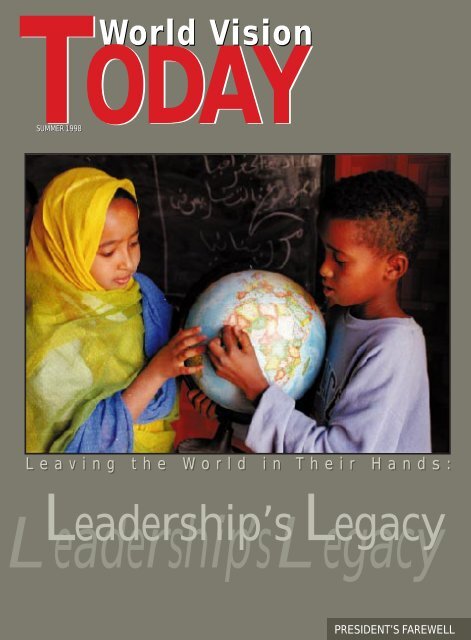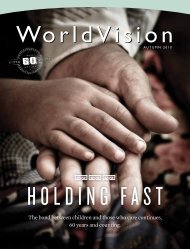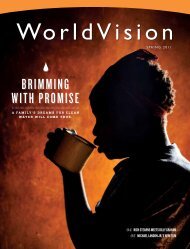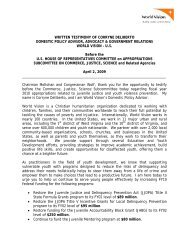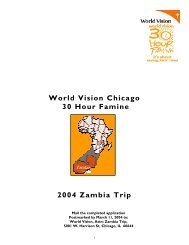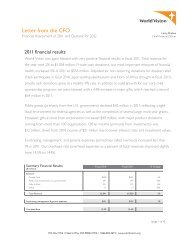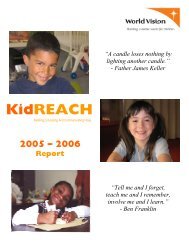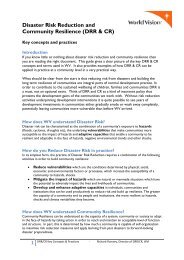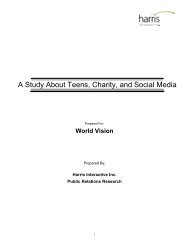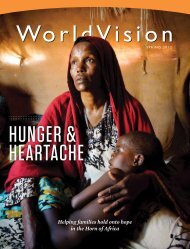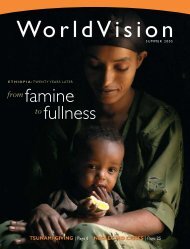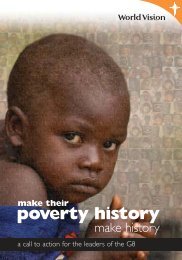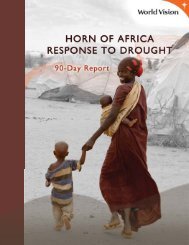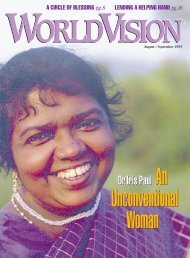World Vision ODAY
World Vision ODAY
World Vision ODAY
Create successful ePaper yourself
Turn your PDF publications into a flip-book with our unique Google optimized e-Paper software.
<strong>World</strong> <strong>Vision</strong><br />
T<strong>ODAY</strong><br />
SUMMER 1998<br />
Leaving the <strong>World</strong> in Their Hands:<br />
Leadership’sLegacy<br />
Leadership’s Legacy<br />
PRESIDENT’S FAREWELL
Leadership’s<br />
Legacy<br />
<strong>World</strong> <strong>Vision</strong> T<strong>ODAY</strong>’S issue on leadership is inspired by Bob<br />
Seiple, who this month ends 11 years as God’s servant at the<br />
helm of <strong>World</strong> <strong>Vision</strong>. Bob has been an indefatigable champion<br />
for children because he understands that they are our emerging<br />
leaders—indeed, the world’s future. In this spirit, the following<br />
stories celebrate Bob and his exemplary tenure by introducing<br />
you to people who have been faithful, as he was, when called to<br />
leadership and service.<br />
Bob Seiple begins<br />
his tenure as the fourth<br />
president of <strong>World</strong> <strong>Vision</strong><br />
United States.<br />
Bob visits and helps re-establish<br />
ministry in Vietnam. Having flown<br />
300 combat missions over Vietnam<br />
as a U.S. Marine nearly two decades<br />
before, Bob is moved by his trip.<br />
Reconciliation becomes a major thrust<br />
of <strong>World</strong> <strong>Vision</strong>’s ministry during the<br />
next decade.<br />
A three-year Child Survival<br />
and Beyond campaign begins.<br />
<strong>World</strong> <strong>Vision</strong> United States raises<br />
$500 million to support immunization,<br />
medical care, food aid,<br />
and parent education. In 1988,<br />
38,000 children died each day<br />
from malnutrition and preventable<br />
diseases; today that number has<br />
been reduced to 33,000 thanks<br />
in part to the work of agencies<br />
such as <strong>World</strong> <strong>Vision</strong>.<br />
1987 <strong>World</strong> <strong>Vision</strong><br />
United States<br />
PRESIDENT 1998<br />
The Washington Forum is<br />
established. In an effort to promote<br />
awareness among <strong>World</strong> <strong>Vision</strong><br />
donors in the United States, this<br />
annual gathering brings together<br />
experts on issues of<br />
global importance.<br />
The 30 Hour Famine begins<br />
in the United States. In an<br />
effort to educate youth and to<br />
cultivate a future donor base,<br />
Bob encourages the development<br />
of this program. An estimated half<br />
million young people will participate<br />
in 1998.<br />
<strong>World</strong> <strong>Vision</strong> United States<br />
provides more than $1.3<br />
million worth of food,<br />
medicine, and relief supplies<br />
to Somalians suffering from<br />
famine as a result of drought<br />
and anarchy caused by clan<br />
warfare.<br />
The <strong>World</strong> <strong>Vision</strong> United States<br />
headquarters relocates from<br />
Monrovia, Calif., to Federal Way,<br />
Wash. Completed on schedule<br />
and on budget, the move should<br />
result in a $5.8 million savings.<br />
1987 1988<br />
1990<br />
1992<br />
1993<br />
1994 1995 1997<br />
REPRINTED FROM WORLD VISION UNITED STATES 1997 ANNUAL REPORT<br />
BRUCE BRANDER / WORLD VISION<br />
<strong>World</strong> <strong>Vision</strong> plays a<br />
major role in rebuilding<br />
Mozambique. Following<br />
an October 1992 peace<br />
treaty, <strong>World</strong> <strong>Vision</strong> United<br />
States helps supply relief<br />
goods, resettlement help,<br />
and agricultural rehabilitation<br />
to Mozambican families.<br />
After Bob visits Rwanda<br />
twice in 1994, <strong>World</strong> <strong>Vision</strong><br />
United States dedicates $8.2<br />
million to providing emergency<br />
relief and reconciling children<br />
with parents and relatives in<br />
this country torn apart by<br />
brutal fighting between Hutu<br />
and Tutsi tribes. “This will be<br />
the most important task in<br />
which the partnership has<br />
ever participated,” Bob wrote<br />
after his trips. “The choice is<br />
obvious: reconciliation<br />
or more massacres.”<br />
Bob Seiple<br />
Bob visits Romania shortly after<br />
the overthrow of Romanian dictator<br />
Nicolae Ceausescu. <strong>World</strong> <strong>Vision</strong><br />
United States commits to help<br />
neglected children in Romania’s<br />
orphanages and to improve the<br />
country’s medical system. On a<br />
subsequent visit, Bob helps<br />
negotiate the first working<br />
agreement between the Orthodox<br />
and Reformed churches in Romania<br />
since the Communist takeover in<br />
the 1940s.<br />
Relief and reconciliation work<br />
intensifies in Bosnia-Herzegovina.<br />
After four years of war, which<br />
fragmented the former country of<br />
Yugoslavia and claimed some 1.5<br />
million lives, Bob visits the region<br />
and focuses national attention on<br />
the situation by hosting <strong>World</strong><br />
<strong>Vision</strong>’s Bosnia Briefing in<br />
Washington, D.C.<br />
<strong>World</strong> <strong>Vision</strong> establishes its Institute<br />
for Global Engagement. In an effort to<br />
increase donor awareness of worldwide<br />
humanitarian issues and to create more<br />
effective partnerships with the church,<br />
<strong>World</strong> <strong>Vision</strong> United States launches<br />
this new policy, strategic planning,<br />
advocacy, and education arm.<br />
Bob celebrates<br />
10 years of<br />
faithful service<br />
to <strong>World</strong> <strong>Vision</strong>.
Story by STEVE HAYNER<br />
Servant and leader:<br />
Bob Seiple in Cambodia.<br />
6 <strong>World</strong> <strong>Vision</strong> T<strong>ODAY</strong> Bob<br />
STEVE REYNOLDS / WORLD VISION<br />
Playing to<br />
an Audience<br />
of One<br />
“Our ambition is not leadership, but servanthood.<br />
Our task is not to grow leaders, but to make<br />
disciples who will follow Jesus,” writes Steve Hayner,<br />
president of InterVarsity Christian Fellowship<br />
U.S.A., in this reflection on Christian leadership.<br />
<strong>World</strong> <strong>Vision</strong> is<br />
one of the U.S.<br />
Agency for<br />
International<br />
Development’s<br />
principal partners<br />
in providing child<br />
survival activities,<br />
food assistance, and emergency<br />
relief services, as well as longer-term<br />
agricultural and physical rehabilitation<br />
and training. Bob Seiple’s vision,<br />
compassion, and leadership helped<br />
<strong>World</strong> <strong>Vision</strong> expand its scope in<br />
carrying out its mission of feeding the<br />
hungry, caring for the sick, sheltering<br />
the homeless, and helping to reconcile<br />
and bring peace to suffering humanity.<br />
I wish him well and congratulate him<br />
on a job well done.<br />
—J. Brian Atwood,<br />
Administrator, USAID<br />
Years ago I framed a magazine ad of<br />
a teenage boy doing a handstand<br />
on the grass. Behind him is a grade<br />
school boy somersaulting. And<br />
behind them is a little guy with his<br />
bottom up in the air, trying to get his body<br />
over the hump. The caption says: “When<br />
you’re out in front and others follow, that’s<br />
leadership!”<br />
Being a leader is not about a title or position.<br />
It is about influence and modeling. I’m<br />
convinced that it’s our daily journey—with<br />
its myriad of small decisions either toward or<br />
away from the Savior—that really matters.<br />
Leaders can either help or hinder those journeys.<br />
That is precisely why godly character is<br />
so important in leaders; we never know who<br />
is watching and following. Recently I recognized<br />
a politician on an airplane and watched<br />
as he very humbly and gently cared for an<br />
older person who was having difficulty carrying<br />
his luggage off the plane. That politician<br />
didn’t know I was watching. He didn’t<br />
know he was being a leader for me at that<br />
moment.<br />
Working at leadership is not the first step<br />
in becoming a leader. Following Jesus is.<br />
Jesus was clear on the importance of the<br />
integrity and consistency of our walk with<br />
him. “Good people bring good things out of<br />
their hearts but evil people bring evil things<br />
out of their hearts” (Matthew 12:35). Thus<br />
what we are as a disciple will be evident in all<br />
that we do, including our leadership. Our<br />
obedience, both in the interior life and also in<br />
our relationships with people and our possessions,<br />
becomes far more important than<br />
well-crafted plans or impressive programs.<br />
The most fundamental quality the Bible<br />
connects with godly leadership is servanthood.<br />
Learning leadership begins with learning<br />
humility, vulnerability, a willingness to<br />
do what is needed, “preferring one another,”<br />
giving our lives away, and recognizing that<br />
we are stewards—never owners—of the gifts<br />
of God. Jesus repeatedly admonished his disciples<br />
whenever they talked about exerting<br />
I will never<br />
<strong>World</strong> <strong>Vision</strong><br />
Bob Seiple not<br />
forget the week<br />
has challenged<br />
only carried on<br />
Bob Seiple led<br />
Christians with<br />
the great tradition<br />
me and a few<br />
the importance of<br />
begun by <strong>World</strong><br />
other pastors<br />
creating a clear<br />
<strong>Vision</strong> founder<br />
through Bosnia.<br />
presence of caring<br />
Bob Pierce and<br />
Never before has<br />
in a world of<br />
followed by former<br />
my heart been so<br />
tremendous need.<br />
presidents Stan<br />
broken. Bob helped me see that a lot For that reason, <strong>World</strong> Relief is honor- Mooneyham and Ted Engstrom, he<br />
of good can flow from a broken heart. ing Bob Seiple with its Helping Hands brought the ministry to new heights.<br />
It was the beginning of our church’s award this year. We appreciate the<br />
Not only have millions of children been<br />
investment in the healing of Bosnia. partnership with <strong>World</strong> <strong>Vision</strong> in meet- helped; not only has starvation and<br />
We are thankful that, under Bob’s<br />
ing the needs of the poor, a task which hunger been alleviated, but a great<br />
leadership, <strong>World</strong> <strong>Vision</strong> has included all of us have only just begun.<br />
witness has been made to the world,<br />
congregations in its vision of global<br />
—Clive Calver, President, showing that it is Christians who take<br />
partnership.<br />
<strong>World</strong> Relief their faith seriously enough to care for<br />
—Rev. Dr. Craig Barnes, Pastor,<br />
Seiple<br />
the least of these.<br />
National Presbyterian Church, 1987 <strong>World</strong> <strong>Vision</strong><br />
—Charles W. Colson, Chairman,<br />
United States<br />
Washington, D.C. 1998<br />
Prison Fellowship Ministries<br />
PRESIDENT<br />
6 <strong>World</strong> <strong>Vision</strong> T<strong>ODAY</strong>
power: “The greatest among you must<br />
become like the youngest, and the leader like<br />
the one who serves” (Luke 22:26).<br />
There is a growing amount of modern<br />
literature on servant leadership. But I’m not<br />
sure I agree with leadership as the<br />
fundamental concept and servanthood as the<br />
modifier. Jesus gives an unmodified<br />
call to us to be servants—serving God and<br />
serving one another. Along the way, God<br />
may also call us into specific roles of<br />
leadership. But there is no indication that<br />
obtaining those roles should be a believer’s<br />
ultimate ambition.<br />
Once again, Jesus turns the world’s—<br />
certainly the Western world’s—idea on its<br />
head. Our ambition is not leadership, but servanthood.<br />
Our task is not to grow leaders,<br />
but to make disciples who will follow Jesus.<br />
Our goal is not to get out there and get<br />
things done, but to listen and obey. Our call<br />
is not to exercise power but to be faithful to<br />
our Lord and the way of the servant.<br />
I recall <strong>World</strong><br />
<strong>Vision</strong>’s work in<br />
Laos in the mid-<br />
1970s. <strong>World</strong><br />
<strong>Vision</strong> staff<br />
exhibited a deep<br />
concern and<br />
compassion for<br />
the people, as well as being highly<br />
efficient, which made their efforts<br />
unique. My own visits to countries<br />
where <strong>World</strong> <strong>Vision</strong> serves have<br />
confirmed without exception that its<br />
people perform beyond duty. They<br />
are committed individuals engaged<br />
in mission and ministry. I have<br />
always been very proud to be identified<br />
as a staunch advocate on behalf<br />
of <strong>World</strong> <strong>Vision</strong>.<br />
—Mark O. Hatfield,<br />
U.S. Senate (retired)<br />
How God chooses to use his servants is<br />
his concern. We may be called to lead or to<br />
follow, to exert authority or to submit, to<br />
turn our God-given gifts in one direction or<br />
another. But that is God’s business. Our identity,<br />
our meaning in life, our sense of significance,<br />
and our self-worth are not to be based<br />
on the roles we fill, the power we wield, or<br />
the numbers we lead. We play to an audience<br />
of one, who loves us, affirms us, and uses us.<br />
Whether we are called to perform the handstand<br />
or simply watch and clap from the<br />
sidelines, we should long to hear from our<br />
God the words, “Well done, you good and<br />
faithful servant!” ■<br />
Steve Hayner has 10 years of experience leading<br />
InterVarsity Christian Fellowship U.S.A., the Madison,<br />
Wis.-based ministry that<br />
nurtures college students’<br />
spiritual and vocational<br />
growth in nearly 800 campus<br />
charter groups nationwide.<br />
Hayner holds a Ph.D. in Old<br />
Testament, and is a Presbyterian<br />
minister, husband, and father<br />
of three.<br />
People who are<br />
citizens of this<br />
world and the<br />
world to come<br />
can ill afford not<br />
to care about<br />
what <strong>World</strong> <strong>Vision</strong><br />
does if we are truly<br />
interested in biblical stewardship of<br />
our resources and Christian care of<br />
the disadvantaged. As President of<br />
<strong>World</strong> <strong>Vision</strong>, Bob Seiple draws from<br />
the tragedy he witnesses and lights<br />
a fuse among us for an educated,<br />
compassionate response. Under his<br />
leadership, <strong>World</strong> <strong>Vision</strong> has become<br />
more proactive—now preventing what<br />
were once considered inevitable<br />
calamities.<br />
—Mike McIntosh, Pastor,<br />
Grace Church, Federal Way, Washington<br />
The poor,<br />
marginalized,<br />
disadvantaged,<br />
and oppressed are<br />
Jesus in his distressing<br />
disguise.<br />
I salute Bob Seiple<br />
and the <strong>World</strong><br />
<strong>Vision</strong> team for calling caring<br />
Christians and people of good will to<br />
make a difference in our hurting world.<br />
—Dan O’Neill, President and<br />
Co-Founder, Mercy Corps International<br />
Text by TIM DEARBORN<br />
Staying Behind …<br />
Moving Ahead<br />
Icame to work at <strong>World</strong> <strong>Vision</strong> because I<br />
found in its leader someone whom I<br />
wanted to follow. My relationship with<br />
Bob Seiple began as friends and fellow pilgrims<br />
in a weekly prayer group through<br />
our church. I discovered in him a person<br />
with several distinct qualities:<br />
VISION—an ability to lead from a clear picture<br />
of the future, rather than merely<br />
stumbling in a fog through our complex<br />
present.<br />
WISDOM—the capacity to discern and<br />
clearly express the most important factors<br />
in moving with creative boldness toward<br />
God’s future.<br />
FOCUS—in the midst of the daunting and<br />
complex issues that clamor for attention, a<br />
deep heart for the center—Jesus Christ; the<br />
ability to detect his voice and his priorities,<br />
and the integrity to live for God with total<br />
abandon.<br />
COMMITMENT—the courage to do the difficult,<br />
pursue the unpopular, and advocate<br />
on behalf of the overlooked.<br />
COMPASSION—though surrounded by all<br />
the trappings of power and significance,<br />
the tenderness to weep with the wounded,<br />
and express kindness to the troubled.<br />
Having found a leader with those qualities,<br />
and having worked with him at <strong>World</strong><br />
<strong>Vision</strong> for less than two years, imagine my<br />
sorrow that he’s leaving.<br />
Yet, I’m staying. I came because I found<br />
a leader, but I’m staying because I found in<br />
<strong>World</strong> <strong>Vision</strong> an organization that leads.<br />
I’ve worked in many organizations over the<br />
years, but I’ve never been part of one that<br />
as fully expresses these five qualities—until<br />
now. Effective leaders contribute to the<br />
development of a staff, a team, and an organization<br />
which bring honor to God and<br />
leads us toward God’s coming kingdom.<br />
In the past 11 years, Bob has led <strong>World</strong><br />
<strong>Vision</strong> through many turbulent issues:<br />
reconciliation in post-war Vietnam; reconstruction<br />
of Cambodia; resolution of<br />
genocidal conflicts such as in Bosnia and<br />
Rwanda. He expanded <strong>World</strong> <strong>Vision</strong> from a<br />
fund-raising, relief organization to one<br />
that also creates relationships and works<br />
for community development. He built bold<br />
partnerships with government agencies<br />
and other organizations, and served as a<br />
courageous advocate in the name of Christ<br />
for ethical public policies and a more civil<br />
public square. The long-term links Bob<br />
established with donors has doubled the<br />
income and ministry involvement of <strong>World</strong><br />
<strong>Vision</strong>’s U.S. office.<br />
God built within<br />
<strong>World</strong> <strong>Vision</strong> a body<br />
of servants who lead<br />
with vision, wisdom,<br />
Christ-centered<br />
commitment, and<br />
compassion. It is a<br />
privilege to work<br />
with them. They, too,<br />
are a tribute to Bob’s<br />
leadership. ■<br />
Bob Seiple and Tim Dearborn<br />
Tim Dearborn is Chief of Staff in the Office of the<br />
President, and Director of the Institute for Global<br />
Engagement.<br />
<strong>World</strong> <strong>Vision</strong> T<strong>ODAY</strong> 7<br />
DON AYLARD / WORLD VISION
➤<br />
Father Benigno Beltran worked with garbage scavengers in Manila, the capital<br />
of the Philippines, helping to transform them into a productive Christian<br />
community. His ministry has earned many honors, including <strong>World</strong> <strong>Vision</strong>’s<br />
1997 Robert W. Pierce Award for Christian Service. But Fr. Ben points to<br />
obedience: “I would not do otherwise. Jesus would not do otherwise.”<br />
When Father Ben Beltran came<br />
to Smokey Mountain 20<br />
years ago, he saw a garbage<br />
heap almost 100 feet high,<br />
reeking of methane gas and<br />
from humiliating scavenging to better jobs,<br />
and converted the squatter settlement into<br />
something resembling a real neighborhood.<br />
The success earned Fr. Ben international<br />
attention, funding, and access to Philippine<br />
polluting the air and water. The dump- President Fidel Ramos. But to this modest<br />
site—ironically named for its resemblance man, none of that equals his long, loving<br />
to the Smokey Mountains in the United association with Smokey Mountain, where<br />
States—was a blight on the landscape, a children take his hand and press it to their<br />
political hot potato, a shameful symbol of<br />
urban decay. It was also home to a large<br />
foreheads in a gesture of honor.<br />
squatter population.<br />
GOING TO THE MOUNTAIN<br />
The young Fr. Ben’s life is inextricably entwined<br />
Catholic priest with Smokey Mountain. He has become<br />
resolved, “In more a product of this place than the<br />
a Christian forests of Mindinao (a southern Philippine<br />
country, there island) where he was born in 1946. His<br />
should not be parents, Benigno Sr., a retired government<br />
25,000 people official, and Concepcion, a teacher, recall<br />
surviving by that Ben, the oldest of five, was drawn to<br />
picking through the religious life early, signing up to be a<br />
the garbage.” church altar boy before he could see over<br />
That day, he the altar. A serious student, he was valedic-<br />
Once upon a dump: Even children<br />
used to scavenge for recyclable<br />
items, breathing in carcinogens and<br />
began to<br />
dream of a<br />
torian of both his elementary and high<br />
school graduating classes.<br />
risking cuts and skin infections. new Smokey After college, Ben entered the seminary<br />
Mountain. of the Society of the Divine Word, assisted by<br />
Now, the dream is being realized by Benigno Sr., who quit smoking and drinking<br />
Sambayanang Kristiyano, Smokey<br />
and put that money toward Ben’s expenses.<br />
Mountain’s self-sufficient, spiritually- Although originally interested in missions<br />
strong community. Under Fr. Ben’s tute- work in Africa, the newly-ordained Fr. Ben<br />
lage, community members have turned seemed destined to teach in the seminary.<br />
But he was troubled by his inability to<br />
8 <strong>World</strong> <strong>Vision</strong> T<strong>ODAY</strong><br />
MIKEL FLAMM / WORLD VSION<br />
Story by JANE SUTTON<br />
Telling It On a Mountain<br />
SANJAY SOJWAL / WORLD VISION<br />
<strong>Vision</strong>ary: “The greatest poverty<br />
is poverty of the imagination,”<br />
says Fr. Ben, standing in a Smokey<br />
Mountain residential building that<br />
replaced squatter shacks. “You<br />
have to believe, and God will help<br />
you.”<br />
➤
connect theory with practice. His solution:<br />
“I decided to look for the poorest of the<br />
poor and just be with them.” He asked the<br />
Sisters of Charity, Mother Theresa’s order,<br />
to help him find a needy place. They sent<br />
him to Smokey Mountain.<br />
Since 1954, Manila’s government had<br />
been dumping garbage on this former<br />
fishing area. As the dump grew, so did the<br />
number of scavengers—people broken by<br />
the hardships of the city who had no choice<br />
but to live among refuse and rats. Politicians,<br />
journalists, and aid workers came to gawk<br />
at the dumpsite, quickly fleeing the stench<br />
and crushing poverty. Fr. Ben stayed.<br />
“I was not trained for breathing in<br />
smoke and particles 24 hours a day, or eating<br />
inside mosquito nets because otherwise the<br />
food would be full of flies,” he says. “Nobody<br />
can train you for that.” He developed chronic<br />
bronchitis and allergies.<br />
Fr. Ben led the celebration of the<br />
Eucharist every Sunday in a run-down<br />
chapel that was later repaired to become the<br />
Church of the Risen Christ. “[The Mass] was<br />
the answer to the people’s prayers,” Fr. Ben<br />
says. “It gave them a sense of identity.” He<br />
walked around the shantytown and talked<br />
to people, gradually earning their trust.<br />
Fr. Ben’s vision for the community<br />
crystallized in 1983. The government,<br />
eyeing the financial opportunities of a revitalized<br />
waterfront, forcibly resettled the<br />
Smokey Mountain squatters to another<br />
area. “The people came back because there<br />
were no jobs,” Fr. Ben recalls. “They were<br />
starving to death.” He set up a tarpaulin<br />
for a temporary chapel, and the work<br />
began in earnest. Starting with the natural<br />
leaders, he began training people to form<br />
“basic Christian communities”— families<br />
grouped into cells with elected leaders<br />
representing their interests on various<br />
problem-solving committees, including<br />
10 <strong>World</strong> <strong>Vision</strong> T<strong>ODAY</strong><br />
livelihood, health, education, culture,<br />
spirituality, sport, and housing.<br />
Some community factions opposed the<br />
work. Fr. Ben received death threats. Once,<br />
a grenade was hurled onto the roof of his<br />
living quarters. It didn’t explode, nor did it<br />
deter him. He dismisses the incident as a<br />
nuisance “on equal terms with the flies.”<br />
His parents remember Ben’s perseverance:<br />
“I cannot run away from problems,” he<br />
told them.<br />
Smokey Mountain changed Fr. Ben. “I<br />
learned that God is speaking through the<br />
poor,” he says. “We should not think that only<br />
theologians understand the Bible. We have not<br />
listened to the poor. Just because they are<br />
unlettered does not mean that the truths of<br />
the Bible cannot be revealed to them.”<br />
Fr. Ben discovered during his two<br />
decades of urban ministry: “You should<br />
not come to the poor to save them, but<br />
to save yourself.”<br />
Fr. Ben implemented Bible sharing, in<br />
which community members read and discuss<br />
Scripture, empowering them to take a<br />
more active role in their faith without cues<br />
from clergy—a break with tradition in this<br />
predominantly Catholic country. “Even in<br />
our absence, people can talk about problems<br />
and settle issues,” says Fr. Jerome Marquez,<br />
who joined the Smokey Mountain staff in<br />
1995. “It makes the Bible the key to community<br />
organizing, sustenance, and growth.”<br />
As funding came in from the Philippine<br />
and U.S. governments, private donors, and<br />
relief agencies (<strong>World</strong> <strong>Vision</strong> supported<br />
leadership training), the community<br />
launched education programs and built a<br />
water system, a multi-purpose center, and<br />
paved walkways between people’s homes<br />
and the dump. Such changes had great<br />
impact on residents such as Christine<br />
Calisterio, who used to be shunned at the<br />
market because she smelled after trudging<br />
through muddy garbage. Families also<br />
moved from their squatter shacks into<br />
temporary housing, and soon will live in<br />
attractive permanent apartments. “I only<br />
started to believe in miracles when I came<br />
here,” says Fr. Jerome.<br />
MISSIONARIES TO THE ASPHALT JUNGLE<br />
The Society of the Divine Word seminary<br />
in Tagaytay, a three-hour drive from<br />
Manila, offers a glimpse into the other side of<br />
Fr. Ben’s life—contemplation, regeneration.<br />
The quiet seminary, surrounded by lush<br />
banana and coffee plants and colorful<br />
bougainvillea, provides the perfect setting.<br />
Fr. Ben teaches here two days a week, preparing<br />
young seminarians for urban ministry.<br />
“You have to read and keep up with theorists,<br />
otherwise you run out of ideas,” he explains.<br />
Part of Fr. Ben’s effectiveness in the<br />
classroom is that he lives what he teaches,<br />
says Fr. Jerome, a former student. “[The<br />
work] becomes very concrete when you see<br />
it in action.”<br />
“A new humanity is being born in the<br />
city, and that’s why missionaries should go<br />
there,” insists Fr. Ben. “Our romanticism<br />
tells us we should go to places like New<br />
Guinea. But the decisions influencing the<br />
lives of hundreds of millions are not made in<br />
the villages, but in the asphalt jungle.”<br />
Recently he presented a multi-media<br />
symposium on “The Church in the City,”<br />
introducing seminarians to global urbanization<br />
trends and the complex needs of the<br />
urban poor, ending with a challenge to the<br />
church to respond. The information overwhelmed<br />
many of the young men from<br />
rural regions. But in the open forum, one<br />
student commented, “Hope for the city is in<br />
our hands. We are the church. But before<br />
we can change the world, we must change<br />
ourselves.”<br />
Such is the task of those who will follow in<br />
Fr. Ben’s footsteps. At 51, he is ready to leave<br />
Smokey Mountain in the capable hands of<br />
community leaders. At the year’s end he will<br />
travel to the United States to set up an urban<br />
ministry training program with missiologist<br />
Ray Bakke. There are, after all, many Smokey<br />
Mountains in the world needing the “new<br />
heavens and new earth” promises of Isaiah 65.<br />
“What we have reaped here is all<br />
because a man had a vision,” says Fr.<br />
Jerome. “It’s like Jesus’ vision for everybody—the<br />
kingdom of God.” ■<br />
➤<br />
End of an era: Despite his popularity in<br />
Smokey Mountain, Fr. Ben worked<br />
himself out of his job by equipping the people<br />
to continue the community’s development.<br />
“They know what should be done,” he<br />
says. “They know hundreds of things.”<br />
<strong>World</strong> <strong>Vision</strong> T<strong>ODAY</strong> 11<br />
SANJAY SOJWAL / WORLD VISION
SIERRA LEONE: REBUILDING LIVES<br />
Farmers in Sierra Leone are pleading for<br />
seeds to replant their fields after seven<br />
years of sporadic civil war.<br />
Sierra Leoneons rejoiced this spring when<br />
democratically-elected President Alhaji Ahmad<br />
Tijan Kabbah, who was deposed in a military<br />
coup in May 1997, returned to power after the<br />
illegal junta was ousted.<br />
However, villagers emerged from hiding only<br />
to find their homes emptied or burned to the<br />
ground. Even their handmade hoes were gone;<br />
their seed stock stolen or eaten by retreating<br />
“junta boys”—rebels as young as 10. Health<br />
services are almost non-existent and the public<br />
education system has collapsed; all schools have<br />
been closed since the 1997 coup. Widespread<br />
neglect of water and sanitation facilities has<br />
caused rampant disease. Families are surviving<br />
on yams and other bush food.<br />
ASIA: ECONOMIC CRISIS<br />
HITS THE POOR<br />
The poor in Asia’s neediest countries are<br />
shouldering the long-term impact of<br />
the region’s financial crisis: job losses,<br />
food price hikes, and social service cuts. <strong>World</strong><br />
<strong>Vision</strong> staff expect the crisis to exacerbate<br />
social and economic problems, including the<br />
expulsion of migrants to preserve local jobs,<br />
higher interest rates, and increased prostitution<br />
and narcotics use.<br />
Korea, one of the wealthier, more stable<br />
countries, has also been affected. The local cur-<br />
12 <strong>World</strong> <strong>Vision</strong> T<strong>ODAY</strong><br />
Reported by KAREN HOMER, MARGARET JEPHSON, AND SHERYL WATKINS<br />
<strong>World</strong> <strong>Vision</strong> plans to provide farmers with<br />
seeds and tools, enabling them to grow food for<br />
their families. “I know that I am doing God’s<br />
work, trying to help people get back on their<br />
feet,” says <strong>World</strong> <strong>Vision</strong> worker Abu Yarmah.<br />
➤<br />
With seeds, tools, and technical advice from <strong>World</strong><br />
<strong>Vision</strong>, farmers like Baindu Williams will be able to<br />
grow enough rice to feed her three sons.<br />
rency lost half its value. Korean government<br />
funding for <strong>World</strong> <strong>Vision</strong>’s 13 community development<br />
centers has been cut by 10 percent. Oh<br />
Jae Shik, director of <strong>World</strong> <strong>Vision</strong> Korea, is concerned<br />
about the impact rising fuel oil costs will<br />
have on the 76 orphanages <strong>World</strong> <strong>Vision</strong> assists.<br />
Despite budget constraints, <strong>World</strong> <strong>Vision</strong><br />
Korea plans to provide counseling and job<br />
placement assistance to the surge of newly<br />
unemployed. <strong>World</strong> <strong>Vision</strong> has nearly 30,000<br />
supporters in Korea, including 15,000 child<br />
sponsors.<br />
WINNIE OGANA / WORLD VISION<br />
1997<br />
Annual<br />
Report<br />
<strong>World</strong> <strong>Vision</strong>’s<br />
life-changing,<br />
Christ-centered<br />
ministry is only<br />
possible through<br />
dedicated donors, caring staff, and<br />
courageous community members.<br />
Thanks to them, the number of <strong>World</strong><br />
<strong>Vision</strong> projects last year grew to 4,408,<br />
boosting the number of beneficiaries to<br />
60,105,512.<br />
To request a copy of <strong>World</strong> <strong>Vision</strong>’s<br />
Annual Report, which includes information<br />
and figures on the lives touched<br />
through new and continuing programs,<br />
call (800) 777-5777. You can also look<br />
it up on our website at www.worldvision<br />
.org/worldvision/comms.nsf/stable/ar.<br />
A Different<br />
Kind of<br />
Courage<br />
“From survival in Vietnam to the<br />
tenderness of rediscovered intimacy,<br />
here’swhatittakestobeaman.”<br />
Jim Horsley, <strong>World</strong><br />
<strong>Vision</strong>’s director<br />
of development, is<br />
a decorated Navy<br />
A TOP-RATED BLUE ANGEL PILOT FINDS THAT<br />
BEING THE BEST IS NOT ENOUGH<br />
combat pilot who<br />
flew with the Blue JIM HORSLEY<br />
WITH MARK CUTSHALL<br />
Angels, the elite<br />
flight demonstration team. His career<br />
was filled with adventure, applause,<br />
and glory. But none of it mattered when<br />
his life began to unravel. A Different<br />
Kind of Courage (Word Publishing) is<br />
the engaging account of one man’s<br />
struggle to move beyond the masked<br />
pain of a forged public image in his<br />
search for significance. This one-of-akind<br />
story speaks to anyone who has<br />
ever stood at life’s crossroads and<br />
asked, “What’s next?” Horsley’s book<br />
is available in Christian bookstores.<br />
<strong>World</strong> <strong>Vision</strong> T<strong>ODAY</strong> 13
Moses Sinet Pulei, a former <strong>World</strong> <strong>Vision</strong> sponsored child from Kenya, grew up<br />
a Maasai in a home made of cow dung and sticks. But he entered a strange,<br />
new wilderness when he ventured to the United States to go to Whitworth College<br />
in Spokane, Wash., five years ago. Now attending graduate school at San Francisco<br />
Theological Seminary, Moses tells in his own words how he became a “man of<br />
two worlds.”<br />
Istarted school late because my dad<br />
didn’t think a Maasai needed an education—“white<br />
man’s magic.” He<br />
asked whether it was possible to be an<br />
educated Maasai, to hold a spear and knife<br />
in one hand and books in the other. He<br />
didn’t see how those two things go together.<br />
That created some tension because my mom<br />
really wanted me to go to school. I did not<br />
go until age 8 or 9, and I worked hard to<br />
catch up.<br />
The primary school was close by, but<br />
high school was 14 miles away. I ran or<br />
walked barefoot 28 miles a day. To keep my<br />
uniform clean I would carry it in my book<br />
bag and wear my regular clothing while I<br />
ran. Near school there was a farm, so I<br />
would go to the cattle trough and wash up<br />
and put on the uniform to walk into class.<br />
The government provides free primary<br />
education, but you have to buy your own<br />
books and materials. Probably by American<br />
standards it is not expensive, about $40 or<br />
$50 per term. For a Kenyan family, that is a<br />
month’s salary. We could afford food to survive,<br />
but without <strong>World</strong> <strong>Vision</strong> intervening,<br />
I would not have been able to go to school<br />
and neither would my three brothers.<br />
It was like night and day, what life<br />
became after sponsorship. I got my uniform<br />
and things I needed for school. Before,<br />
14 <strong>World</strong> <strong>Vision</strong> T<strong>ODAY</strong><br />
WHERE ARE THEY NOW?<br />
Story by MOSES SINET PULEI<br />
Moses in a Different Wilderness<br />
if I got sick I would go to a government<br />
hospital and wait in a long line. Sometimes<br />
they did not have the medicine and they<br />
would give me a slip to go buy it. I could<br />
not do that. After getting sponsored, I gave<br />
the slip to the <strong>World</strong> <strong>Vision</strong> person and she<br />
brought me medicine. <strong>World</strong> <strong>Vision</strong> also<br />
started a tree planting project in my community,<br />
because people were desperate and<br />
cut down trees to burn into charcoal to sell.<br />
<strong>World</strong> <strong>Vision</strong> talked with people about the<br />
importance of the environment.<br />
At first I thought <strong>World</strong> <strong>Vision</strong> was just<br />
some people connected to the church who<br />
went from home to home talking to people.<br />
I was skeptical. As time passed, I got to<br />
know <strong>World</strong> <strong>Vision</strong> people who really cared<br />
about me. They did not try to force me into<br />
what they believed.<br />
Maasai pray to Enkai, the creator of<br />
everything. Enkai is the same word we use<br />
to describe the skies—so big they are<br />
beyond description—that is our god. At<br />
first, Christianity did not make sense to us,<br />
that there is one God but there are three<br />
parts to him.<br />
I became a Christian at a <strong>World</strong> <strong>Vision</strong>sponsored<br />
youth camp in my senior year of<br />
high school. My grandfather had died two<br />
years before, and I was devastated. I tried to<br />
be strong, but I still felt emptiness. At this<br />
camp, when they talked about Christianity,<br />
JANE SUTTON / WORLD VISION<br />
➤<br />
Man on campus: Moses at Whitworth College, now more<br />
at ease with American customs and academic life.<br />
it seemed that it absorbed all those things—<br />
blessed are those who are mourning<br />
because they will be happy. I started connecting<br />
my own experiences with what<br />
was being taught.<br />
My dad thought it was a passing cloud.<br />
Eventually my parents came to accept it.<br />
KENYA<br />
My mom became a Christian when my dad<br />
died last year, through Christian friends<br />
who visited her.<br />
When I was still a new Christian, I was<br />
told about a missionary, Dr. Fred Strang,<br />
who was learning the Maasai language<br />
and could help answer my questions. We<br />
became great friends. Then I started work-<br />
<strong>World</strong> <strong>Vision</strong> T<strong>ODAY</strong> 15
ing with another missionary, Tim Fairman,<br />
with Young Life who ministered to street<br />
kids in Nairobi. Both Tim and Fred said,<br />
“There is a lot of potential in you. It would<br />
be great if you could get a college education.”<br />
Tim’s daughter went to Whitworth,<br />
and she talked very highly of it. The<br />
Fairmans worked with a few churches to<br />
get me some scholarships. That is how I<br />
ended up in Spokane.<br />
My first impression of the United<br />
States: People move too fast. You would<br />
think they are late to catch a train. In<br />
Africa, there is no hurry. Everything here<br />
was different—food, driving on the wrong<br />
side of the road.<br />
In my freshman year at Whitworth, I<br />
was the cultural diversity advocate, mediating<br />
communication between different<br />
cultures on campus. I was also a dorm resident<br />
assistant, and senior year I was student<br />
body president.<br />
I was also a teaching<br />
assistant in several classes.<br />
The more I am exposed to<br />
teaching, the more I feel it is<br />
God’s plan for me. One of my<br />
goals is to understand how to<br />
communicate theology in<br />
other cultures. How do you<br />
explore the idea of culture<br />
and Christian faith with the<br />
Maasai and help people feel<br />
that it’s their own faith?<br />
I go back to Kenya every<br />
summer, leading missions<br />
trips and study groups. I<br />
appreciate the beauty of my<br />
homeland now. There are<br />
some things in my culture<br />
that I want to hold on to,<br />
and there are some things<br />
16 <strong>World</strong> <strong>Vision</strong> T<strong>ODAY</strong><br />
JOHN SCHENK / WORLD VISION<br />
that I feel I have to let go to be who I am.<br />
I’m living proof that sponsorship<br />
works. I’m just one of many. I know people<br />
who have done something with their lives<br />
because someone sponsored them—teachers<br />
in Kenya, a friend in medical school<br />
who is going to be a surgeon. When you<br />
sponsor a child, you invest in someone. I<br />
think that’s what Christian faith is all<br />
about; Christ invested in his disciples. You<br />
create hope, a sense of dignity. You bring<br />
the whole love of Christ to the child. ■<br />
Vibrant culture: Moses says that if he hadn’t<br />
gone to school, he would be living much like<br />
these Maasai<br />
villagers. “But<br />
we say that a<br />
zebra never leaves<br />
its stripes, so I<br />
guess I’m always<br />
going to be a<br />
Maasai.”<br />
Text by DIANA MOORE and LAURA WHITE<br />
Illustration by RON WHEELER<br />
➤<br />
1<br />
Your Turn<br />
FOR KIDS TO EXPERIENCE<br />
THE MANY COLORS AND PATTERNS OF GOD’S WORLD<br />
In some places in Africa, children play the sanku, a musical instrument similar to a harp,<br />
but with only one string. With the help of an adult, you can make your own sanku.<br />
YOU WILL NEED:<br />
Knife; scissors; 12-inch thin string; 26inch<br />
bendable stick; construction paper;<br />
paints and brush, crayons, or markers;<br />
matchstick or toothpick; large empty<br />
plastic bottle with flat bottom; clear tape.<br />
Cut the plastic bottle in half<br />
about five inches from the base.<br />
Use the bottom half of the bottle<br />
and cut a small hole in<br />
the center of the base. Make<br />
Strumming in Sudan: Wisdom<br />
Sabit plays hymns on his<br />
adungo, which is like a sanku.<br />
WINNIE OGANA / WORLD VISION<br />
✂<br />
4<br />
2<br />
3<br />
two holes opposite each other at the brim<br />
(big enough for the stick to fit through).<br />
Turn the bottle upside down so the bottom<br />
is facing up. Cover the sides of the bottle<br />
with construction paper and clear tape.<br />
Where the construction paper covers<br />
the holes, cut a star shape<br />
and then push the construction<br />
paper flaps into the holes in the<br />
bottle. Decorate the construction<br />
paper with paints, markers, or stickers.<br />
Push the stick through the two holes in the<br />
sides of the bottle. Tie one end of the string<br />
around the matchstick or<br />
toothpick and thread the<br />
match through the small hole in<br />
the base of the bottle. Pull the string<br />
tight. Fasten the other end of the string to<br />
the stick as shown.<br />
TO PLAY:<br />
Hold the instrument and pluck the string. Different tensions<br />
on the string produce different sounds. You could use a<br />
small piece of wood as a bow. Have fun!<br />
Instructions for making a sanku instrument are adapted<br />
from “Some Crafty Things To Do,” a collection of craft ideas<br />
for children and teachers published by Oxfam United<br />
Kingdom and Ireland and are reproduced with permission<br />
of Oxfam Publishing.<br />
ILLUSTRATIONS FOR CONSTRUCTION OF MUSICAL INSTRUMENT BY DIANA MOORE<br />
<strong>World</strong> <strong>Vision</strong> T<strong>ODAY</strong> 17
Life Without Brakes<br />
Oregon native Dorothy Scheffel has served as a <strong>World</strong> <strong>Vision</strong> nurse<br />
in several African countries wracked with turmoil and danger. She<br />
doesn’t consider herself a heroine, but rather “one of the lucky ones<br />
who gets to see the people <strong>World</strong> <strong>Vision</strong> helps.”<br />
After four years of caring for<br />
famine victims, vaccinating children<br />
in war zones, and dodging<br />
armed attacks, crisis situations<br />
are Dorothy Scheffel’s unintended specialty.<br />
Dorothy served from 1993 to 1996 as a<br />
<strong>World</strong> <strong>Vision</strong> health coordinator in Sudan, a<br />
country suffering from a 15-year civil war<br />
between the Arabic government based in the<br />
northern city of Khartoum and the black<br />
African rebels of the south. More than 1.5<br />
million people have been killed since the war<br />
began. Dorothy, who managed two health<br />
programs and eight staff in remote Tonj and<br />
Yambio counties, helped evacuate staff four<br />
times due to impending attacks, and survived<br />
the torching of a village where <strong>World</strong><br />
<strong>Vision</strong> worked.<br />
“Sudan has nothing, nothing, nothing,”<br />
Dorothy reports. War has destroyed the<br />
country’s economy, communications, and<br />
health services. Few schools and only three<br />
hospitals remain. “There’s no way of people<br />
getting help except for what relief agencies<br />
bring in.”<br />
Dorothy accompanied immunization<br />
teams to a different site each day, traveling<br />
by utility vehicle over bumpy roads and<br />
rickety bridges, sometimes with the brakes<br />
disconnected as rough roads wore out the<br />
brake pads every 48 hours. “You crash into<br />
trees occasionally,” Dorothy quips.<br />
20 <strong>World</strong> <strong>Vision</strong> T<strong>ODAY</strong><br />
Mobile teams cover 35 clinics per<br />
month, providing inoculations against<br />
measles, polio, diphtheria, whooping cough,<br />
tetanus, and tuberculosis. After <strong>World</strong><br />
<strong>Vision</strong> came to the area in 1993, immunization<br />
rates for children in Yambio rose from<br />
zero to 63 percent in the first two years. In<br />
Tonj, the rate of full-course immunizations<br />
increased to five percent—a huge accom-<br />
plishment given that these nomadic people<br />
lacked health care for 12 years before <strong>World</strong><br />
<strong>Vision</strong> arrived.<br />
The satisfaction of improved coverage,<br />
however, didn’t compare with Dorothy’s<br />
delight at seeing a mother arrive at a health<br />
clinic with a baby on her back and several<br />
other children in tow, having walked six<br />
miles in her determination to have her<br />
family immunized. <strong>World</strong> <strong>Vision</strong> provided<br />
farmers with seeds and agricultural training<br />
that resulted in a bountiful harvest.<br />
By 1996, Dorothy found that only a few<br />
children came to the clinics malnourished.<br />
Prior to joining the Sudan team,<br />
Dorothy devoted a year<br />
as a <strong>World</strong> <strong>Vision</strong> nurse<br />
in Somalia during the<br />
East African country’s<br />
1992 anarchy and<br />
famine. Before that, she<br />
volunteered for six<br />
years as a nurse with<br />
the evangelical organization<br />
Youth With A<br />
Mission in Kenya and<br />
Uganda.<br />
Working in war<br />
zones deepened<br />
Dorothy’s spiritual<br />
➤<br />
Personal touch:<br />
Dorothy examines<br />
a Somali patient.<br />
Several months earlier,<br />
she treated shrapnel<br />
wounds he suffered<br />
while defending <strong>World</strong><br />
<strong>Vision</strong>’s supplies from<br />
looters.<br />
AMAZING STAFF<br />
Story by HOLLY BETH STORMS<br />
Photograph by REVERIE ZURBA<br />
insight. “I probably understand the heart<br />
of God a lot better now,” she explains. “I<br />
think he hurts when he sees situations like<br />
Sudan.”<br />
While recognizing God’s compassion,<br />
Dorothy struggles with God’s justice. “Why<br />
was I born in America with all the abundance<br />
we have when these people were born<br />
in southern Sudan with nothing? People<br />
who have a lot—I think God expects more<br />
from us somehow,” she reflects. “It’s not as<br />
if I owe God something, but it’s a Christian<br />
responsibility to be involved in situations<br />
like this when we can help suffering people.”<br />
Dorothy’s assignment in Sudan ended in<br />
late 1996, when she moved to <strong>World</strong><br />
<strong>Vision</strong>’s office in Washington, D.C. Drawing<br />
upon the management skills she gained in<br />
Africa and her knowledge of <strong>World</strong> <strong>Vision</strong>’s<br />
work in the field, she recruits new staff to<br />
work in far-flung places. ■<br />
PLEASE pray<br />
for the crisis in<br />
Bahr el Ghazal<br />
province, southern<br />
Sudan:<br />
• For the estimated<br />
500,000 people—<br />
especially malnourished children—facing<br />
starvation due to displacement, fighting, and<br />
drought.<br />
•For <strong>World</strong> <strong>Vision</strong> staff working in difficult<br />
conditions to provide emergency food, medical<br />
care, seeds, and survival kits.<br />
•For a peaceful end to the conflict between the<br />
Sudanese Army and the Sudan People’s<br />
Liberation Army.<br />
PRAY with thankfulness that the government of<br />
Sudan lifted a ban on relief flights, allowing aid<br />
to reach the suffering victims.<br />
<strong>World</strong> <strong>Vision</strong> T<strong>ODAY</strong> 21
I Leave You A Story<br />
All of us at <strong>World</strong> <strong>Vision</strong> should be<br />
charged with the task of keeping<br />
stories. They represent our tribal<br />
memories. They remind us of<br />
difficulties overcome, hope emerging out of<br />
despair, challenges met, and opportunities<br />
grasped. Stories track what we believe to be<br />
important. As I leave <strong>World</strong> <strong>Vision</strong>, then, it is<br />
only fitting that my parting thoughts center<br />
on a story.<br />
In the early 1990s I visited an orphanage<br />
outside the city of Cluj-Napoca,<br />
Romania. Something was wrong, terribly<br />
wrong. Every child in the orphanage was<br />
less than God intended. Each was in some<br />
state of despair. The orphanage was home<br />
to the deaf, the blind, the mentally retarded,<br />
the physically disabled. I was greeted by<br />
Agafite, a 9-year-old boy without an arm.<br />
Laurentiu, 10 years old, had only stumps<br />
for legs. There was a lad on a skateboard<br />
with no legs at all, pushing himself close to<br />
us. He began to massage my friend’s calves,<br />
as if to say “Why did you get to be born<br />
whole and not me?”<br />
The common denominator, the human<br />
tie that bound each of these kids, was that<br />
each was a product of a failed abortion.<br />
Someone had tried to destroy life in the<br />
womb. The weaponry was arranged against<br />
them, and they became veterans of foreign<br />
wars before they were born. But they won<br />
that war! They were born anyway. They are<br />
alive—but permanently scarred; mentally,<br />
physically, or both.<br />
Another young man came up to me and<br />
asked in perfect English, “Do you love<br />
Jesus?” My first thought was cynical: “This<br />
is a scam, part of a setup. An emotional<br />
‘come on’ to milk the fat cats from the West.”<br />
It was certainly no scam. The director of<br />
the orphanage was a Christian. He taught<br />
his charges a little English, and a lot about<br />
Jesus. We experienced love, hope, and amazing<br />
grace as we toured the orphanage, seeing<br />
various Bible stories unfold in pictures and<br />
words in each decorated room. The orphanage<br />
was a beam of hope in the despair that<br />
was Romania’s child-care program at the<br />
start of the decade.<br />
And the hope was highly personal. I<br />
have been a Christian all my life, but I can’t<br />
remember anyone ever asking me this<br />
question before, “Do you love Jesus?” I’ve<br />
debated theology to the point of anger and<br />
broken relations, watched my church split<br />
over denominational issues, and witnessed<br />
other denominational fights that sapped<br />
energy, eroded Christian credibility, and<br />
destroyed any hope of the power and the<br />
promise of a unified body of Christ. Never<br />
before, however, has any Christian asked<br />
me this most profound question of our<br />
time, or any time—“Do you love Jesus?”<br />
The Lord used a little orphan kid who<br />
almost wasn’t born to challenge me with<br />
the most important thing in life: returning<br />
love to one who first loved us.<br />
<strong>World</strong> <strong>Vision</strong> exists to tell a story. It’s the<br />
Jesus story, a story of unconditional love, of<br />
grace more abundant, of hope made tangible<br />
through his resurrection and sustainable by<br />
the promise of a second coming. There is no<br />
better story. This is the story we react to<br />
when we consider our love for Jesus.<br />
PRESIDENT’S WATCH<br />
ROBERT A. SEIPLE<br />
At the end of the day, we have only one<br />
standard of accountability. As we complete<br />
our business, as we employ best practices in<br />
relief and development, and as we consummate<br />
our fund-raising relationships, we need<br />
to ask: “Did we move people in the direction<br />
of the kingdom, a kingdom synonymous<br />
with its king, our Lord and Savior, Jesus<br />
Christ? Did the Good News of the Gospel<br />
emerge out of our work? Has that Gospel<br />
become more attractive because of the purity<br />
of motive in presenting it through our very<br />
lives?” Ultimately, it’s a very simple question,<br />
“Do we love Jesus?”<br />
A few years ago a friend gave me her<br />
personal mission statement: “To know Jesus<br />
better today than yesterday; to be closer to<br />
Jesus today than yesterday.” Nothing fancy<br />
or complex, but pragmatically workable in<br />
the very depths of our souls.<br />
It also works for organizations. Along<br />
with the stories, I pass it on to all of you.<br />
There’s no better advice. And there is no<br />
better story. ■<br />
Helping Hand: Bob Seiple steadies a<br />
toddler during his 1991 visit to an<br />
orphanage in Cluj-Napoca, Romania.<br />
<strong>World</strong> <strong>Vision</strong><br />
T<strong>ODAY</strong><br />
Issue Number 4, Vol. 1<br />
President Robert A. Seiple<br />
Publisher Dorene Young<br />
Managing Editor Shelly Ngo<br />
Art Director Janet Dahring<br />
Senior Editors Karen Homer, Jane Sutton<br />
Photo Consultant Jon Warren<br />
Contributing Designer Don Aylard<br />
Editorial Assistant Diana Moore<br />
Production Coordinator Kris Baldyga<br />
CORRESPONDENTS<br />
Jacob Akol (Kenya), Pablo Carrillo (Bolivia),<br />
Jamileth Goertzen (Honduras), Margaret Jephson<br />
(South Africa), Philip Maher (Canada), Randy<br />
Miller (<strong>World</strong> <strong>Vision</strong> International), Winnie Ogana<br />
(Kenya), Sanjay Sojwal (Thailand)<br />
CONTRIBUTING PHOTOGRAPHERS<br />
Karen Homer (Cover)<br />
School children in Nouakchott, Mauritania,<br />
explore a globe donated by <strong>World</strong> <strong>Vision</strong>.<br />
Jacob Akol, Bruce Brander, W. Crosby, Winnie<br />
Ogana, Cary Paine, John Schenk, Sanjay Sojwal,<br />
Laura White, Bill Youngblood, Reverie Zurba<br />
<strong>World</strong> <strong>Vision</strong> T<strong>ODAY</strong> shares the stories of<br />
children, their families, and communities as<br />
they experience the tangible hope of the<br />
Gospel in a world of suffering and injustice.<br />
In hope that our relationship and conversations<br />
will grow deeper and increasingly<br />
meaningful, <strong>World</strong> <strong>Vision</strong> T<strong>ODAY</strong> aims to<br />
exceed the highest standards in accuracy,<br />
practicality, and stewardship, and is our<br />
gift to you for your commitment to modeling<br />
Jesus’ life-giving compassion.<br />
Send all editorial correspondence and changes of<br />
address to <strong>World</strong> <strong>Vision</strong> T<strong>ODAY</strong>, P.O. Box 9716, Federal<br />
Way, WA 98063-9716. Please send address changes at<br />
least 30 days before moving and enclose the address<br />
label clipped from a current copy or return envelope.<br />
Charter Member<br />
Evangelical Council for Financial Accountability<br />
Member<br />
Evangelical Press Association<br />
Copyright © 1998 by <strong>World</strong> <strong>Vision</strong> Inc.<br />
E-mail address: WVToday@worldvision.org<br />
visit our website at www.worldvision.org<br />
22 <strong>World</strong> <strong>Vision</strong> T<strong>ODAY</strong> <strong>World</strong> <strong>Vision</strong> T<strong>ODAY</strong> 23<br />
➤<br />
BRUCE BRANDER / WORLD VISION


